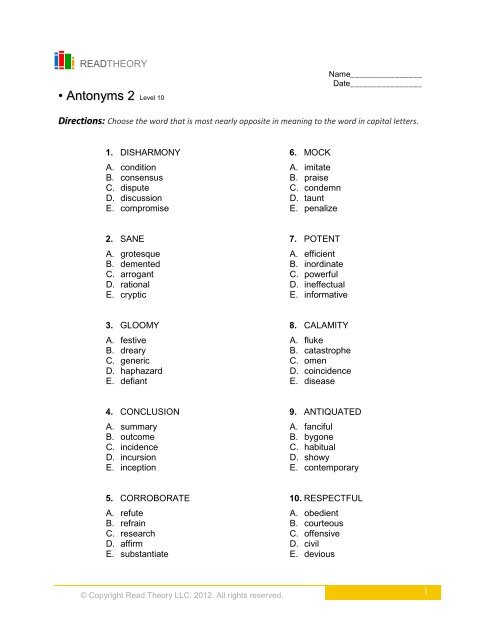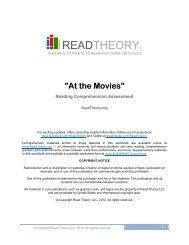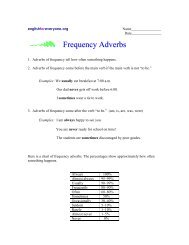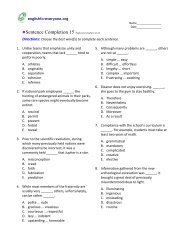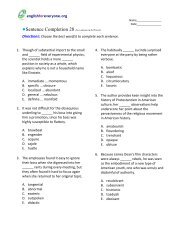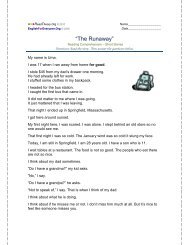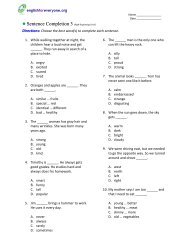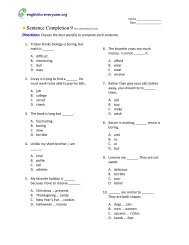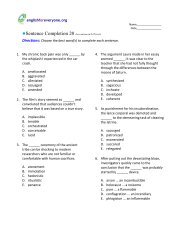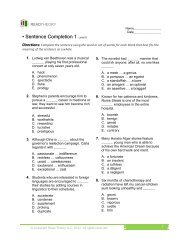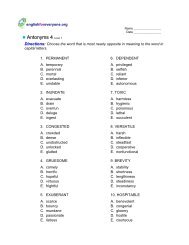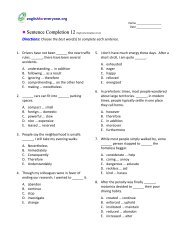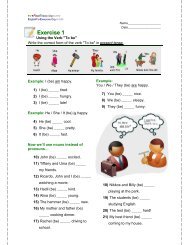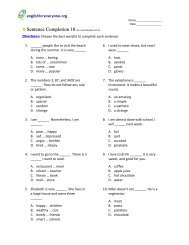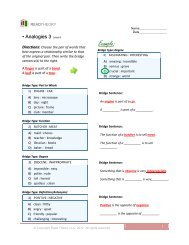• Antonyms 2 - English for Everyone
• Antonyms 2 - English for Everyone
• Antonyms 2 - English for Everyone
Create successful ePaper yourself
Turn your PDF publications into a flip-book with our unique Google optimized e-Paper software.
READTHEORY<br />
<strong>•</strong> <strong>Antonyms</strong> 2 Level 10<br />
© Copyright Read Theory LLC, 2012. All rights reserved.<br />
Name________________<br />
Date________________<br />
Directions: Choose the word that is most nearly opposite in meaning to the word in capital letters.<br />
1. DISHARMONY<br />
A. condition<br />
B. consensus<br />
C. dispute<br />
D. discussion<br />
E. compromise<br />
2. SANE<br />
A. grotesque<br />
B. demented<br />
C. arrogant<br />
D. rational<br />
E. cryptic<br />
3. GLOOMY<br />
A. festive<br />
B. dreary<br />
C. generic<br />
D. haphazard<br />
E. defiant<br />
4. CONCLUSION<br />
A. summary<br />
B. outcome<br />
C. incidence<br />
D. incursion<br />
E. inception<br />
5. CORROBORATE<br />
A. refute<br />
B. refrain<br />
C. research<br />
D. affirm<br />
E. substantiate<br />
6. MOCK<br />
A. imitate<br />
B. praise<br />
C. condemn<br />
D. taunt<br />
E. penalize<br />
7. POTENT<br />
A. efficient<br />
B. inordinate<br />
C. powerful<br />
D. ineffectual<br />
E. in<strong>for</strong>mative<br />
8. CALAMITY<br />
A. fluke<br />
B. catastrophe<br />
C. omen<br />
D. coincidence<br />
E. disease<br />
9. ANTIQUATED<br />
A. fanciful<br />
B. bygone<br />
C. habitual<br />
D. showy<br />
E. contemporary<br />
10. RESPECTFUL<br />
A. obedient<br />
B. courteous<br />
C. offensive<br />
D. civil<br />
E. devious<br />
1
Answers and Explanations<br />
1) B<br />
The word disharmony means discord or disagreement. If two people do not see eye to eye on something, they are in<br />
disharmony with each other. The opposite of disharmony is harmony or agreement. Because consensus is harmony or<br />
general agreement, choice (B) is correct.<br />
(A) is incorrect because a condition is a state, mode, or particular position. This word is not the opposite of disharmony.<br />
(C) is incorrect because a dispute is a difference of opinion. This is synonymous with disharmony, not the opposite of it.<br />
(D) is incorrect because a discussion is an in<strong>for</strong>mal debate or conversation about an issue. It is something done when<br />
there is disharmony, but it is not the opposite of disharmony.<br />
(E) is incorrect because compromise is the settlement of disputes by making concessions. It is something done when<br />
there is disharmony, but it is not the opposite of disharmony.<br />
2) B<br />
The word sane means having a sound mind. One is sane if he or she is free of mental illness. The opposite of sane is<br />
insane, or lacking a sound mind. Because demented means insane, choice (B) is correct.<br />
(A) is incorrect because grotesque means comically hideous. This is not the opposite of sane.<br />
(C) is incorrect because arrogant means proud or haughty. This is not the opposite of sane.<br />
(D) is incorrect because rational means reasonable. This is practically synonymous with sane, not the opposite of it.<br />
(E) is incorrect because cryptic means mysterious. This is not the opposite of sane.<br />
3) A<br />
The word gloomy means dismal or depressing. For example, the atmosphere of a funeral would be gloomy. The opposite<br />
of gloomy is lively or uplifting. Because festive means joyous or celebratory, choice (A) is correct.<br />
(B) is incorrect because dreary means causing sadness or despair. This is synonymous with gloomy, not the opposite of<br />
it.<br />
(C) is incorrect because generic means characteristic of an entire classification or group. This is not the opposite of<br />
gloomy.<br />
(D) is incorrect because haphazard means random or aimless. This is not the opposite of gloomy.<br />
(E) is incorrect because defiant means refusing to yield or showing resistance. This is not the opposite of gloomy.<br />
4) E<br />
The word conclusion means ending. For example, the conclusion of a story is how the conflict is resolved and how the<br />
story ends. The opposite of a conclusion is a beginning. Because an inception is a start or beginning, choice (E) is correct.<br />
(A) is incorrect because a summary is a brief but comprehensive restatement of facts previously stated. This is not the<br />
opposite of conclusion.<br />
(B) is incorrect because an outcome is the final result. This is synonymous with conclusion, not the opposite of it.<br />
(C) is incorrect because incidence is the rate of occurrence. This is not the opposite of conclusion.<br />
(D) is incorrect because an incursion is a temporary invasion. This is not the opposite of conclusion.<br />
5) A<br />
The word corroborate means support a point or idea. When one corroborates something, he or she is confirming or<br />
proving that thing. The opposite of affirm is disagree or argue against. Because refute means disprove, choice (A) is<br />
correct.<br />
(B) is incorrect because refrain means abstain from or resist. This is not the opposite of corroborate.<br />
(C) is incorrect because research means investigate or study. This is not the opposite of corroborate.<br />
(D) is incorrect because affirm means confirm or support. This is synonymous with corroborate, not the opposite of it.<br />
(E) is incorrect because substantiate means establish by evidence or verify by support. This is not the opposite of<br />
corroborate, as both words imply that someone is agreeing with a point.<br />
© Copyright Read Theory LLC, 2012. All rights reserved.<br />
2
6) B<br />
The word mock means attack with ridicule, often by mimicry. To mock someone is to make fun of someone. The opposite<br />
of mock is to express approval. Because praise means commend or express approval, choice (B) is correct.<br />
(A) is incorrect because imitate means to mimic or impersonate. This is not the opposite of mock.<br />
(C) is incorrect because condemn means express disapproval. This is practically synonymous with mock, not the opposite<br />
of it.<br />
(D) is incorrect because taunt means treat with ridicule in a sarcastic manner. This is practically synonymous with mock,<br />
not the opposite of it.<br />
(E) is incorrect because penalize means punish. This is not the opposite of mock.<br />
7) D<br />
The word potent means powerful or greatly effective. For example, a potent medicine would quickly improve one’s health.<br />
The opposite of potent is weak or not effective. Because ineffectual means not effective, choice (D) is correct.<br />
(A) is incorrect because efficient means producing an effect in the best possible or least wasteful manner. This is<br />
practically synonymous with potent, not the opposite of it.<br />
(B) is incorrect because inordinate means excessive. This is not the opposite of potent, as it would instead be used to<br />
describe something unnecessarily strong.<br />
(C) is incorrect because powerful means strong. This is synonymous with potent, not the opposite of it.<br />
(E) is incorrect because in<strong>for</strong>mative means instructive. This is not the opposite of potent.<br />
8) A<br />
The word calamity is a great mis<strong>for</strong>tune or disaster. A tornado that destroys an entire town would be a calamity. The<br />
opposite of calamity would be good luck or a blessing. Because a fluke is a stroke of good luck, choice (A) is correct.<br />
(B) is incorrect because a catastrophe is a sudden and widespread disaster. This is synonymous with calamity, not the<br />
opposite of it.<br />
(C) is incorrect because an omen is a sign indicating a future event. This is not necessarily the opposite of calamity,<br />
because an omen can refer to both good and bad fates.<br />
(D) is incorrect because coincidence is a chance occurrence. This is not the opposite of calamity, since it does not<br />
necessarily refer to good luck only. A coincidence could be either good or bad.<br />
(E) is incorrect because disease is illness. This is not the opposite of calamity, though catching a disease could be an<br />
example of calamity.<br />
9) E<br />
The word antiquated means old-fashioned. For example, a rotary dial phone is an antiquated piece of technology. The<br />
opposite of antiquated is new or modern. Because contemporary means of the same time or of the present time, choice<br />
(E) is correct.<br />
(A) is incorrect because fanciful means whimsical or not realistic. This is not the opposite of antiquated.<br />
(B) is incorrect because bygone means past or earlier. This is practically synonymous with antiquated, not the opposite of<br />
it.<br />
(C) is incorrect because habitual means done by routine, usually involuntarily. This is not the opposite of antiquated.<br />
(D) is incorrect because showy means making an elaborate or imposing display. This is not the opposite of antiquated.<br />
10) C<br />
The word respectful means showing politeness or acting nicely toward others. For example, a respectful person would say<br />
“please” or “thank you.” The opposite of respectful is disrespectful or showing a lack of politeness. Because offensive<br />
means unpleasant, insulting, or disagreeable, choice (C) is correct.<br />
(A) is incorrect because obedient means complying with or submissive to authority. This is not the opposite of respectful.<br />
(B) is incorrect because courteous means polite. This is synonymous with respectful, not the opposite of it.<br />
(D) is incorrect because civil means polite. This is synonymous with respectful, not the opposite of it.<br />
© Copyright Read Theory LLC, 2012. All rights reserved.<br />
3
(E) is incorrect because devious means indirect or circuitous. This is not the opposite of respectful.<br />
© Copyright Read Theory LLC, 2012. All rights reserved.<br />
4


